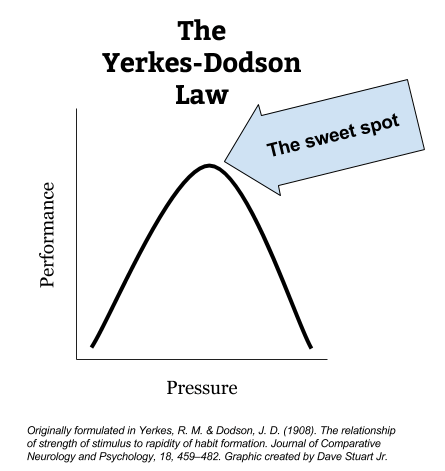The Yerkes-Dodson Law and Its Application to Life
June 5, 2019
Categories: Balance
One of the first things I learned in my introduction to psychology class in college was the Yerkes-Dodson Law. The Yerkes-Dodson Law has to do with the relationship between arousal and performance. The relationship looked like an upside-down U-shaped curve. Higher arousal was related to higher performance, but only to a point. After a certain level of arousal, performance began to decrease.
This relationship is supported by research, and it makes sense if you think about it. You need a certain level of arousal and energy to perform at your best. Athletes get themselves hyped up before a game. A certain level of stress about a test motivates you to study and do your best. You don’t want to sleepwalk through your life.
But that’s not the entire picture. When arousal gets too high, performance starts to decrease. If an athlete is too wound up, they get nervous and their performance suffers. If you are too anxious about an exam, you might not sleep well the night before and forget what you studied. You don’t want to live your life always on high alert.
It turns out that a moderate level of arousal is best for performance.
The Y-D Law Applied to Life
I think the Yerkes-Dodson Law can apply to other areas of our lives as well. For most areas of life, it’s good to apply energy, discipline, and motivation. Life doesn’t just “happen”—we have to create the life we want. If you aren’t applying energy to the system, you are “leaving money on the table” of your life.
However, when you get to a certain point, there are diminishing returns. Sometimes applying more energy, discipline, and motivation to an area of your life actually results in less effectiveness and satisfaction.
For example:
- Making money is good, but after a certain point, more money doesn’t result in increased happiness. There are even some downsides that come along with having a lot of money.
- Having a good job and enjoying your work is great. But if you work too much, you tend to neglect other important aspects of your life, such as your health and family.
- Working out and being physically healthy is really important. But if you work out too much, you could over-train and injure yourself, which results in less overall health in the long run.
- Getting out in the sun is good. It helps your body to experience natural light and get enough Vitamin D. Stay out in the sun too long, however, and you will get burnt and put yourself at risk for skin cancer.
- Trying to find a great partner to marry is awesome. But no one’s perfect. If you have impossibly high standards, you may end up alone and dissatisfied.
- Being connected to your partner is awesome. But if you are too enmeshed, you might lose your sense of self in your relationship, which could decrease your level of happiness in life.
- Focusing on your goals and what you want to accomplish is helpful. But focus too much on what you don’t have yet, and you might find yourself feeling dissatisfied about what you do have. Balancing a goal orientation with gratitude is key.
Good to a Point
In all these areas, the upside-down U-curve of the Yerkes-Dodson Law comes into play. There are so many things in life that are good… to a point. You have to self-reflect and determine where you are on the curve. If there’s more success and happiness to be had, by all means go for it! You only have one life. However, if you are getting to the point where you might have reached the max, it might be time to dial it back a bit. You don’t want to push it so far that you go down the opposite side of the curve.
Discussion
How might the Yerkes-Dodson Law apply to your life? Are there any areas where you feel like you are on the down-side of the curve?

Related Thoughts

Subscribe To My Newsletter
Join my mailing list to receive the latest blog posts.
Receive my e-book “The Mental Health Toolkit” for free when you subscribe.





